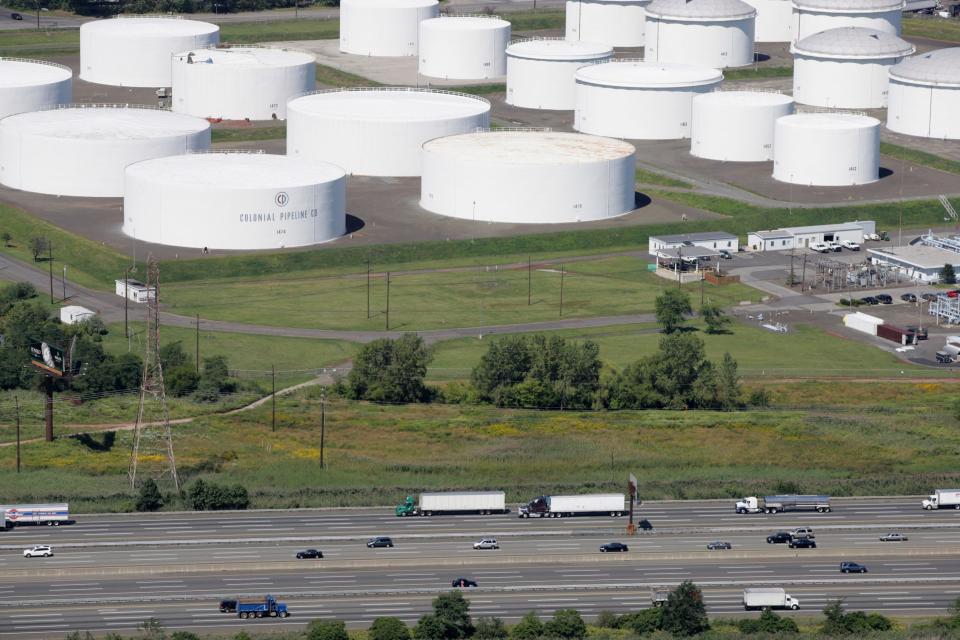Colonial Pipeline looking to 'substantially' restore operations by end of week
A major U.S. energy pipeline, which was hobbled by a ransomware attack over the weekend, is aiming to "substantially" restore service by the end of the week.
The Colonial Pipeline Co. said Monday afternoon it is using a "phased approach" to bring its capacity back online. The system delivers about 45% of the fuel for the East Coast.
The disruption of the Colonial system, which runs more than 5,500 miles from Texas to New Jersey, is threatening to leave some gas stations in the Southeast without fuel. The system carries over 100 million gallons of gasoline, diesel, jet fuel and home heating oil to the East Coast from refineries along the U.S. Gulf..
If the situation isn't fixed soon, stations that rely on the supply could begin running short within days, says Patrick DeHaan, head of petroleum analysis at fuel-savings app GasBuddy, which tracks prices and outages.
"Nobody is out yet, but we’re probably right on the cusp," he adds. "Today, tomorrow, especially Wednesday, you're going to see some outages."
He urged drivers not to panic in states along the Gulf and southeastern Atlantic coasts..
Don't "go out and hoard gasoline and make the problem much worse," he says.
The hackers struck the system with a ransomware attack, which takes computerized systems hostage until a payment is made.
Save better, spend better: Money tips and advice delivered right to your inbox. Sign up for free here
Retirement wealth gap: Here's who benefits from the proposed round of retirement rule changes
The FBI said in a statement Monday that a criminal group known as DarkSide “is responsible for the compromise of the Colonial Pipeline networks. We continue to work with the company and our government partners on the investigation.”
As consumers brace for impact, the possibility of localized fuel outages or price increases depends almost exclusively on how long the pipeline remains down, analysts say.
"My instincts right now tell me this is a major event for the history of cybersecurity but not necessarily for fuel supply or fuel prices," says Tom Kloza, analyst at the Oil Price Information Service. But he adds that if Colonial announces the main lines of their system are down for another three to four days, "it'll get dicier."

Colonial Pipeline said Monday that it's targeting a "goal of substantially restoring operational service by the end of the week."
It also said that the federal government's decision to temporarily allow tanker drivers to exceed statutory limits on their drive time "should help" fuel stations to maintain adequate supplies.
"We continue to evaluate product inventory in storage tanks at our facilities and others along our system and are working with our shippers to move this product to terminals for local delivery," Colonial Pipeline said in its statement.
DeHaan and Kloza said the downtime is unlikely to move the national average price of gasoline by more than a few pennies. The average price for a gallon of regular gasoline on Monday stands at $2.97, up 1 cent from Sunday and 7 cents from a week ago as demand picks up, according to AAA.
"Events like these are not necessarily big price movers," DeHaan says. "This is more of a supply challenge."
The episode illustrates how vulnerable the nation's energy infrastructure is to infiltration.
"It absolutely exposes a major vulnerability," DeHaan says.
Kloza says it's a "wakeup call" for the energy industry, adding "Imagine if it was one of the power companies."
Anne Neuberger, a top White House cybersecurity adviser, said Monday that the attack was carried out by DarkSide, which the FBI has been investigating since October.
“It's a new and very troubling variant, where it's essentially provided as a service and the proceeds are split” with the ransomware developers, Neuberger told reporters at a White House briefing.
Neuberger said U.S. intelligence officials are also investigating whether the attack was backed by a foreign actor. The U.S. intelligence community has blamed said Russia and China for other recent cyberattacks.
Asked if Colonial had paid any money to DarkSide, Neuberger said she would defer that question to the company. She said the U.S. government has not advised the company on that issue.
But the FBI has long warned that paying a ransom would only encourage further attacks.
Elizabeth Sherwood-Randall, a homeland security adviser to President Joe Biden, said the White House is in ongoing contact with Colonial and the company has said it will have the pipeline back in operation soon.
“Colonial is currently working with its private cybersecurity consultants to assess potential damage and to determine when it is safe to bring the pipeline back online,” she said. “Thus far, Colonial has told us that it has not suffered damage and can be brought back online relatively quickly.”
In the meantime, Sherwood-Randall said, the White House is analyzing the impact of the shutdown on the delivery of gas, diesel and aviation fuel in the states that depend on the pipeline and identifying “federal options for alleviating supply shortfalls should they develop.”
Contributing: Kristine Phillips of USA TODAY; and The Associated Press
You can follow USA TODAY reporter Nathan Bomey on Twitter @NathanBomey and subscribe to our free Daily Money newsletter here for personal finance tips and business news every Monday through Friday morning.
This article originally appeared on USA TODAY: Colonial Pipeline cyberattack: Threat could lead to gas shortages

 Yahoo Movies
Yahoo Movies 
